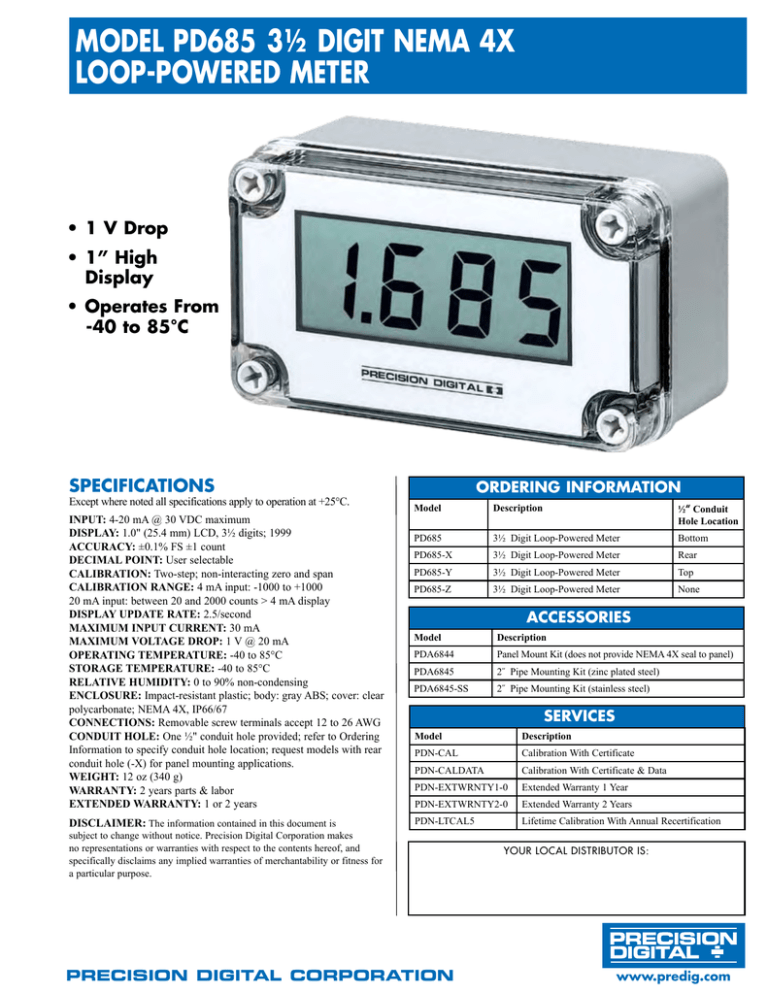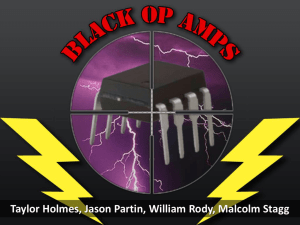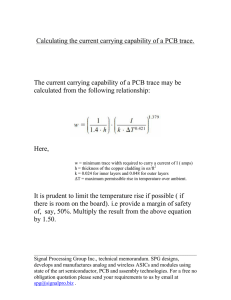Precision Digital PD685 3-1/2 Digit NEMA 4X Loop
advertisement

Model PD685 3½ Digit NEMA 4X LOOP-POWERED Meter • 1 V Drop • 1” High Display • Operates From -40 to 85°C Specifications Except where noted all specifications apply to operation at +25°C. Input: 4-20 mA @ 30 VDC maximum Display: 1.0" (25.4 mm) LCD, 3½ digits; 1999 Accuracy: ±0.1% FS ±1 count Decimal Point: User selectable Calibration: Two-step; non-interacting zero and span Calibration Range: 4 mA input: -1000 to +1000 20 mA input: between 20 and 2000 counts > 4 mA display Display Update Rate: 2.5/second Maximum Input Current: 30 mA Maximum Voltage Drop: 1 V @ 20 mA Operating Temperature: -40 to 85°C Storage Temperature: -40 to 85°C Relative Humidity: 0 to 90% non-condensing Enclosure: Impact-resistant plastic; body: gray ABS; cover: clear polycarbonate; NEMA 4X, IP66/67 Connections: Removable screw terminals accept 12 to 26 AWG Conduit Hole: One ½" conduit hole provided; refer to Ordering Information to specify conduit hole location; request models with rear conduit hole (-X) for panel mounting applications. Weight: 12 oz (340 g) Warranty: 2 years parts & labor Extended Warranty: 1 or 2 years Disclaimer: The information contained in this document is Ordering Information Model Description ½“ Conduit Hole Location PD685 3½ Digit Loop-Powered Meter Bottom PD685-X 3½ Digit Loop-Powered Meter Rear PD685-Y 3½ Digit Loop-Powered Meter Top PD685-Z 3½ Digit Loop-Powered Meter None Accessories Model Description PDA6844 Panel Mount Kit (does not provide NEMA 4X seal to panel) PDA6845 2˝ Pipe Mounting Kit (zinc plated steel) PDA6845-SS 2˝ Pipe Mounting Kit (stainless steel) Services Model Description pdn-cal Calibration With Certificate pdn-caldata Calibration With Certificate & Data pdn-extwrnty1-0 Extended Warranty 1 Year pdn-extwrnty2-0 Extended Warranty 2 Years pdn-ltcal5 Lifetime Calibration With Annual Recertification subject to change without notice. Precision Digital Corporation makes no representations or warranties with respect to the contents hereof, and specifically disclaims any implied warranties of merchantability or fitness for a particular purpose. Precision Digital Corporation YOUR LOCAL DISTRIBUTOR IS: www.predig.com Model Pd685 3½ Digit NEMA 4X LOOP-POWERED Meter Calibrator Connected to Input Signal PCB Control loop Connected to Input Signal PCB DISPLAY PCB COMPONENT SIDE (may be removed for bench calibration) BALANCE CONTROL (factory adjust only) S+ S- S- S+ DP1 DP2 DP3 LOOP JUMPER (remove when Display PCB is connected) S+ S- - RED DISPLAY PCB COMPONENT SIDE INPUT SIGNAL PCB LO CALIBRATION CONTROL HI CALIBRATION CONTROL Calibrator Connected to Display PCB 4-20mA POWER + SUPPLY + TRANSMITTER DP1 DP2 DP3 Field wiring is made to the Input Signal PCB which is mounted to the base of the enclosure. S+ SRED CALIBRATED CURRENT SOURCE BLACK S+ S- Figure 1 S- S+ Figure 3 Figure 2 The Display PCB may be removed from the enclosure for bench calibration. Loop Jumper must be installed on Input Signal PCB to maintain loop, refer to procedures below. LOOP JUMPER + - CALIBRATED CURRENT SOURCE BLACK INPUT SIGNAL PCB (mounted to base of enclosure) Protect enclosure from exposure to chemical solvents and excessive ultraviolet (UV) light (e.g. sunlight). Note: To prevent damage to electronic components caused by electrostatic discharge, a grounding strap should be worn when servicing the display. Conduit Installation Instructions 1. Remove the Display PCB from the enclosure 2. Connect ½" conduit fittings to the hole in the enclosure 3. Connect conduit (with attached hubs*) to the enclosure * Use only conduit hubs that are designed to maintain NEMA 4X or IP ratings. Note: Please read PD686 Intrinsic Safety Barrier Connections for more information pertaining to conduit holes. Mounting Instructions 1. Remove the enclosure cover from the base. 2. Insert mounting hardware into mounting holes in enclosure base (see Figure 4). 3. Secure the enclosure base to the mounting surface using the inserted hardware. 4. Re-attach the enclosure cover to the base. Setup Only a calibrated current source and a screwdriver are needed for calibration. Calibration Connections To access the input terminals it is necessary to remove the enclosure cover and the Display PCB. This is done by loosening the four screws on the enclosure cover and removing the cover. Completely loosen the left screw that holds the Display PCB to the enclosure and loosen the right screw about four turns so the Display PCB remains attached to the enclosure. Rotate the Display PCB 90° to gain access to the Input Signal PCB. Next, connect a calibrated current source as illustrated in Figure 1. Decimal Point Selection The decimal point jumper array is located in the lower right corner of the Display PCB next to the display. It is labeled DP1, DP2, DP3. Place a jumper over both pins of DP1 for a display of 199.9, DP2 for 19.99, or DP3 for 1.999. To remove Display PCB: 1.Loosen the four screws on the enclosure cover and remove the cover from the enclosure base. 2.Completely loosen the left-side screw holding the Display PCB to the enclosure. Loosen the right-side screw four turns so the Display PCB remains secure to the enclosure. 3.Rotate the Display PCB 90° to gain access to the Input Signal PCB. 4.Install Loop Jumper over both pins to bypass Display PCB and allow the signal to flow through the Loop Jumper. The display will go off when the jumper is installed. 5.Disconnect the black and red signal wires from the screw terminal connector. 6.Loosen completely the right-side screw and lift Display PCB from the enclosure. Care should be taken to prevent static electricity from damaging the electronic circuitry. 7.Restore enclosure cover to the base to prevent contamination of components. Restoring Display PCB to the Loop 1.Remove enclosure cover as described in step 1 in the preceding section. 2.Secure Display PCB to enclosure using right-side screw; do not tighten screw to allow rotation of Display PCB while accessing Input Signal PCB. 3.Connect red wire to S+ terminal and black wire to S- terminal, as shown in Figure 1. 4.Remove Loop Jumper to allow the signal to flow through Display PCB (save push-on jumper by placing over one pin only). 5.Tighten screws holding Display PCB and install enclosure cover. Servicing display PCB outside the loop Two modes of input signal allow the user to remove the Display PCB for service without interrupting the loop as indicated above and operate the Display PCB at another location. The loop remains connected to the Input Signal PCB while the Display PCB is absent for service. The user may operate the Display PCB at another location by connecting a signal to the S+ and S- wires on the Display PCB as illustrated in Figure 3. Calibration LO and HI calibration controls are located to the left of the display (see Figure 1). Apply a signal equal to 4 mA and adjust the LO control to display the desired reading. Apply a signal between 16 and 20 mA and adjust the HI control to display the desired reading. Complete the calibration procedure by making any minor adjustments to the LO and HI controls. D Mounting Holes Located Beneath Cover Screws A E F C Installation Installation of the meter involves removing the Display PCB from its enclosure and connecting a conduit fitting. Use conduit and fittings (not included) suitable for the degree of ingress protection required. Mounting holes are located at each corner of the enclosure. Refer to Figure 4. Loop Connections Disconnect power to the loop and install the meter as illustrated in Figure 2. Replace the enclosure cover. Removing Display PCB From the Loop SIDE VIEW B FRONT VIEW Figure 4 Dimensions and Mounting Information A: 3.15" (80 mm) B: 5.51" (140 mm) The Display PCB and Input Signal PCB are connected together with one black and one red wire. The wires are soldered to the Display PCB and connected to a screw terminal connector on the Input Signal PCB. Precision Digital Corporation 19 Strathmore Road • Natick MA • 01760 • USA • Tel: (800) 343-1001 • Fax: (508) 655-8990 C: 2.36" (60 mm) D: 4.72" (120 mm) E: 2.56" (65 mm) F: 0.79" (20 mm) LIM685 Rev B 01/07 www.predig.com

